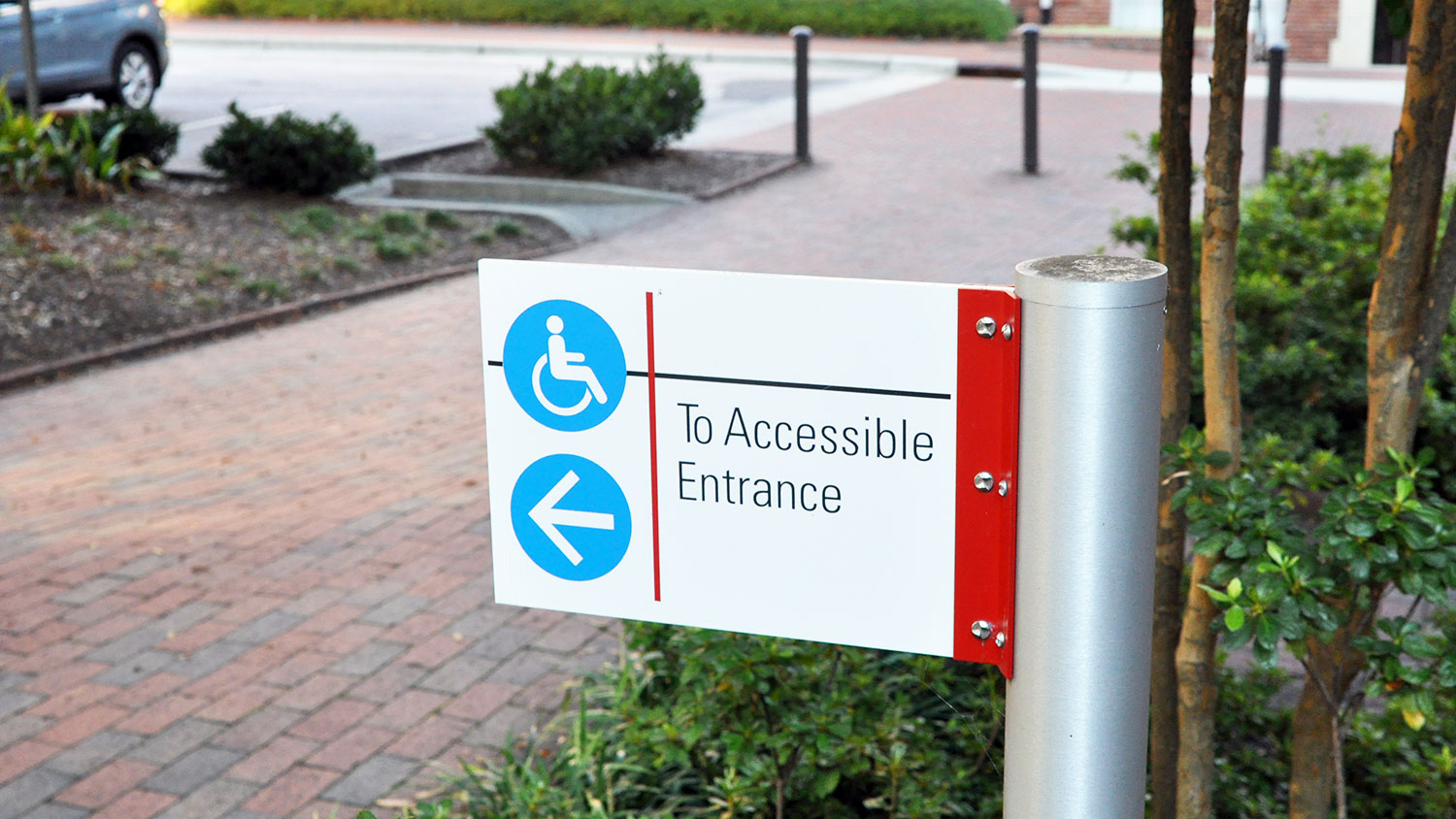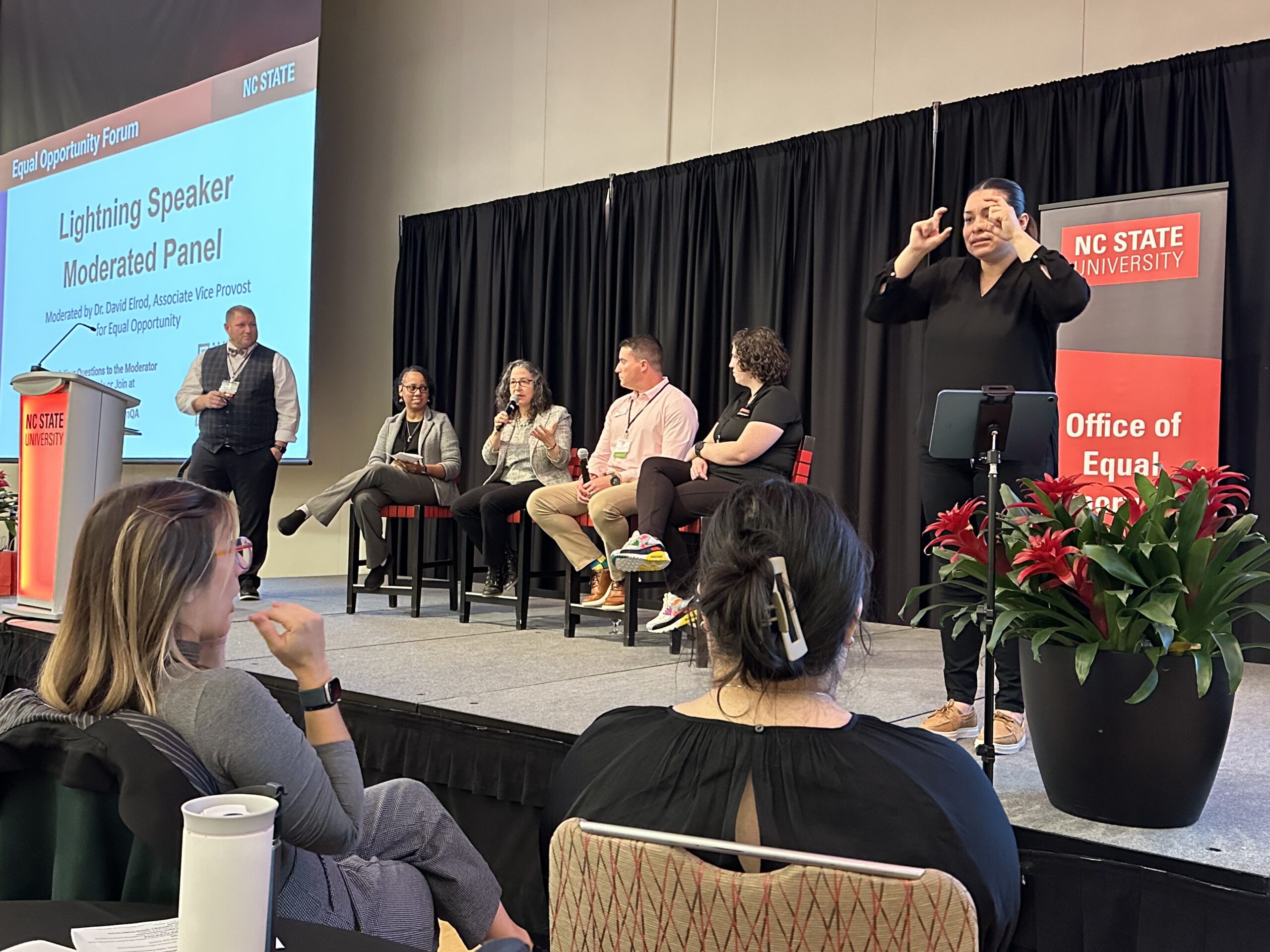Making NC State Accessible for All

 While some students may not know about the Disability Resource Office (DRO), a significant number benefit from it throughout the year. In the 2017-18 academic year, 1,827 unique undergraduate, graduate and summer students received assistance from the office, requesting and receiving many different types of accommodations to support their success.
While some students may not know about the Disability Resource Office (DRO), a significant number benefit from it throughout the year. In the 2017-18 academic year, 1,827 unique undergraduate, graduate and summer students received assistance from the office, requesting and receiving many different types of accommodations to support their success.
Led by Director Mark Newmiller, a 15-year NC State veteran, DRO has a staff of nine, including four access consultants; coordinators for both testing and assistive technology; and two administrative staff members. The office is located in University College Commons, next to Student Health on Cates Avenue, and is part of the Division of Academic and Student Affairs.
Serving Both Students and Faculty
The DRO staff devotes roughly half of its time in service to students and the other half in service to faculty. For example, Sabina Vermuelen, Jamie Coccarelli, Maggie Faulkner and Leslie Watts, all access consultants, review student accommodation requests and documentation, suggest available accommodations and consult on alternate solutions when needed. On the faculty side, the consultants work with instructors to help provide accessible course content that meets the requirements of the course.
Likewise, Rebecca Sitton, coordinator of assistive technology, divides her time equally between providing assistive technology tools and training to students and helping instructors provide accessible content in their courses through technology.
Thomas Martin, coordinator of testing, devotes about half of his time to scheduling exams for students with accommodations and the other half assisting instructors with setting up testing. In 2017-18, DRO provided testing accommodations for 1,254 unique students and 1,053 unique instructors, for a total of 6,887 tests administered.
Accommodations Can Be Complex
DRO approaches each student’s request for accommodations individually. The process involves looking at each student’s documentation, learning about the accommodations they’ve used in the past and noting the standard accommodations the student might need based on known barriers and a general list of eligible accommodations, such as note-taking or alternate formats.
Students work with their instructors to determine which accommodations they might need for a particular course. If the student requests a different (or non-standard) accommodation, a DRO consultant can work with the instructor to determine if the accommodation is reasonable.
A reasonable accommodation is defined as one that does not lower academic standards or change the essential requirements of the course objectives.
Newmiller notes that course requirements are sometimes based on traditional methods of teaching that may or may not actually pertain to mastery of a subject. For example, the speed at which a test is completed may not directly relate to the mastery of a subject area. In contrast, there are requirements that might need to be completed in a prescribed amount of time, such as observing a reaction in a lab.
Partnering for Accessibility
DRO partners with many offices on campus. Two of its frequent partners are the Office for Institutional Equity and Diversity (OIED) and the Office of Information Technology (OIT).
As compliance offices, both DRO and OIED oversee NC State’s adherence to the requirements of Section 504 of the Rehabilitation Act of 1973, the Americans with Disabilities Act of 1990 (ADA), the ADA Amendments Act of 2008 and North Carolina law. DRO’s focus is on academic accommodations for students while OIED provides accommodations for employees and houses the university’s ADA coordinator, currently Interim Vice Provost Sheri Schwab, who is responsible for overseeing campus-wide accessibility issues.
The offices work together and share knowledge. Together, they may consult on issues pertaining to specific cases, and DRO may request guidance from a legal or policy standpoint from OIED.
DRO also works with OIT, which houses the university’s IT accessibility coordinator, a role currently held by Crystal Tenan. Tenan provides information, training and guidance on accessibility that pertains to web and online content and tools. She also oversees OIT’s procurement of campus-wide tools and technologies and helps resolve systemic digital accessibility issues.
Looking to the Future
When asked about current trends in the area of serving students with disabilities, Newmiller points to the continuing move toward universal design, which focuses on creating content that is accessible to everyone without accommodations. While universal design is not a new concept, it is one that is still emerging due to the need to change old processes as well as old ways of thinking.
Newmiller states, “Values are changing as to what is required to succeed, and this will remove barriers for students with disabilities. We have faculty who are more cognizant during planning and who are being taught new methods.” Flexible schedules, service animals and alternate housing options are some of the many examples that can be implemented to make it possible for students to fully experience what NC State has to offer.
How You Can Help
Newmiller emphasizes that DRO is available year-round to consult on solutions and encourages both students and faculty to contact the office early.
“We welcome the opportunity to answer questions. Don’t wait or assume, be proactive. Contact us at the start of the semester, before problems arise.” He also recommends the following:
- Visit the DRO website for information for both students and faculty, including requesting accommodations, providing accommodations, obtaining testing accommodations or assistive technology, and other resources, such as reporting an accessibility issue on campus; how to use Wolfpack Pick Up, the campus transport service for those needing help moving around on campus; how to request interpreting services such as sign language; campus demographics; and policies, rights and responsibilities.
- Look for upcoming workshop offerings for instructors on topics such as developing accessible documents from DRO and OIT.
- Anyone on campus who is planning an event should refer to Planning an Accessible Event to ensure that they follow the correct procedure for accommodating attendees with disabilities, including the accommodations statement to place on event marketing materials, planning your events with accessibility in mind and providing requested accommodations before and during your events.
Mark Newmiller is director of the Disability Resource Office. He can be reached at 919.515.7653.
- Categories:


